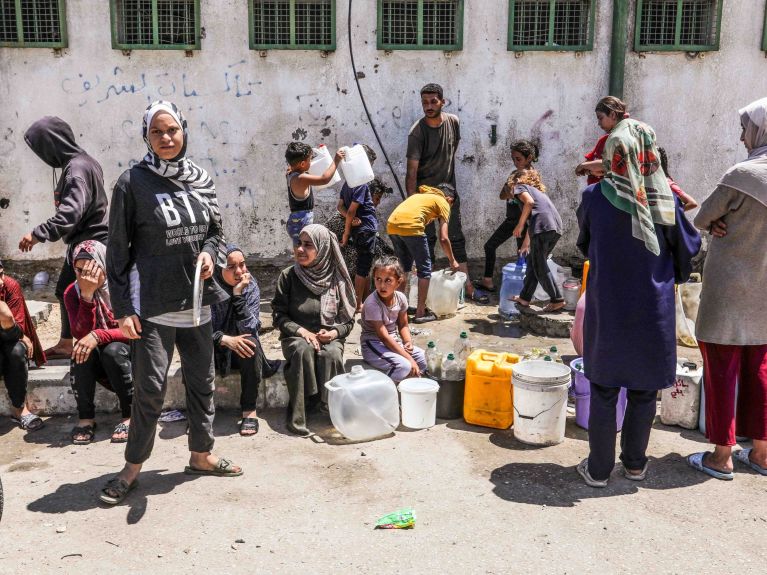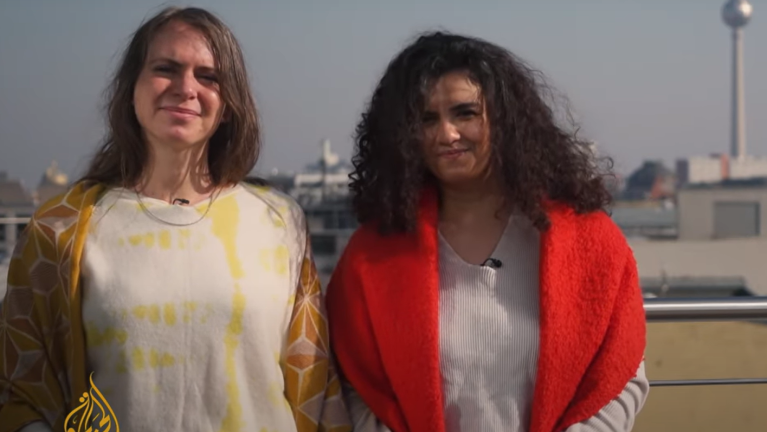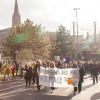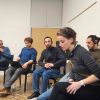Help for the people in the Gaza Strip
Tom Kellner from Israel and Seba Abu Daqa from Palestine are helping refugees in Gaza with their Clean Shelter project - and have become friends in the process.

Seba Abu Daqa makes heart emojis rain across her Zoom screen. The gesture is directed towards Tom Kellner. The two women, one from Palestine and the other from Israel, are in daily contact. So often, in fact, that they like to joke about how their families are getting jealous. Normally their main topic of conversation is their Clean Shelter project, which has seen them install around a thousand toilets, showers, tents and communal areas to date, helping to make everyday life just a little bit more bearable for a good 2,000 refugee families in the Gaza Strip.
The warmth between the two women can be felt even through the screen. “We have a very similar view of the world,” says Kellner. She has two daughters and lives in Berlin, where she works as a cellist and a lecturer in literature. Abu Daqa lives in Munich and is an advisor for a non-governmental organisation committed to women’s rights. Both were born in 1982, but the idea that they would become friends in Germany is hardly something that could have been taken for granted. Seba Abu Daqa grew up in the southern Gaza Strip, whereas Tom Kellner was raised in a small town in the north of Israel.

A glimmer of hope in calamitous times
They met on 8 October 2023 of all days - just one day after Hamas terrorists broke through Israel’s border fortifications, killed 1,160 people and took around 250 hostages. And they became friends during the course of last year, which was characterised by a constant stream of dire news from the Gaza Strip being bombarded by Israel. It was a time when Israelis and Palestinians, even in Germany, could hardly have been further apart.
Tom Kellner and Seba Abu Daqa are among the 17 Israelis and Palestinians who joined a dialogue project. Inspired by an Arab-Jewish peace village in Israel, Slieman Halabi decided to establish a forum for dialogue in Germany, too. The date for the first video call had long been set for 8 October 2023. Though everyone was in a state of shock, all 17 attended the meeting.
Challenges and help during the first months of the war
“The first months of the war were a nightmare,” recalls Abu Daqa. Her mother, who has since been able to flee to Egypt, was involved in an aid project at the time. Her father, who refuses to leave his homeland to this day, was searching amongst the rubble for hens that might have survived. When the internet went down for five days, she could only assume the worst. Then came the winter rains, flooding the ruined buildings. Abu Daqa wanted to take action - and Kellner offered to help. Talking to Abu Daqa’s family, it became clear what was needed most urgently: dry shelters, drinking water – and sanitary facilities: to stop diseases from spreading, but also to give people at least one square metre of privacy.
Gali Blay, another Israeli woman from the dialogue group, created a website, and Tom Kellner began fundraising via her network. Her Palestinian partner couldn’t believe how many Israelis were prepared to donate money for Gaza. “I found this very touching,” says Seba Abu Daqa.
Dieses YouTube-Video kann in einem neuen Tab abgespielt werden
YouTube öffnenThird party content
We use YouTube to embed content that may collect data about your activity. Please review the details and accept the service to see this content.
Open consent formAdapting aid to scarce resources
Meanwhile, she herself used her contacts in Gaza to set up a team of helpers. Their first job was to build sanitary facilities comprising a toilet and shower. The idea was to create a place where hygiene - and dignity - could be preserved. In the overcrowded camps, that is an issue that affects women and older people in particular. At the same time, the helpers worked with another organisation to set up their own camp.
Since it is virtually impossible to bring materials into the Gaza Strip, the Palestinians have to work with whatever they can get hold of on the local market: there is less and less available, and everything is becoming more and more expensive. “But it’s incredible how creative people become in a crisis,” says Abu Daqa. She explains that Ahmed Sherif, a civil engineer who is her team manager on the ground, is constantly out and about, keeping his eyes open, and so far has always found an alternative solution. Like a system of pipes the team built themselves to access water for washing from a neighbouring camp. So far, they have succeeded in organising everything in Gaza or, if necessary, having it produced themselves, like the detergent to clean the toilets. It is now also being used in other camps.
Their latest achievement is a small solar-powered desalination system. “With it, we can produce clean water for around 250 of our families,” says Kellner. To date, a lot of the money raised from donations has been used merely to buy drinking water.
As the helpers on the ground work almost solely on a voluntary basis, the team in Germany has to be as tactful as possible. They quickly discovered that there was little point in coming up with ready-made solutions, says Abu Daqa: “At first, the people there say ‘yes’ to everything.” It hurts her to see the extent to which Palestinians in Gaza are used to having people from abroad tell them what is good for them. “They lose their self-confidence as a result, and also their motivation.” In the meantime, however, the people she works with are now willing to say exactly what they need in Gaza, and the team in Germany has learnt to hand over responsibility to them.
Spontaneous reactions to a situation in flux
“The situation on the ground can often change from one minute to the next, which also changes what is needed.” At the moment, they are planning a new camp at the team’s request, while at the same time doing their best to respond as spontaneously as possible to emerging crises. This could be anything from a sudden evacuation order issued by the Israeli army to an acute outbreak of lice. “An anti-lice shampoo currently costs a good 50 euros,” says Keller.
They are happy to share the knowledge they have accumulated and the network they have set up, says Kellner. However, Clean Shelter’s priority is to provide sanitary facilities. “At the moment, more people in Gaza are dying from disease and poor hygiene than from the attacks,” explains Abu Daqa. The population will long continue to suffer from the consequences of malnutrition alone. “It is very frustrating not to be able to do more. But we have to think in terms of one day at a time.”
Only Kellner’s twelve-year-old daughter dares to envision a future for Gaza after the war. Recently she painted a picture of how she imagines peace: big houses with lots of animals, vegetable gardens - and plenty of toilets.



